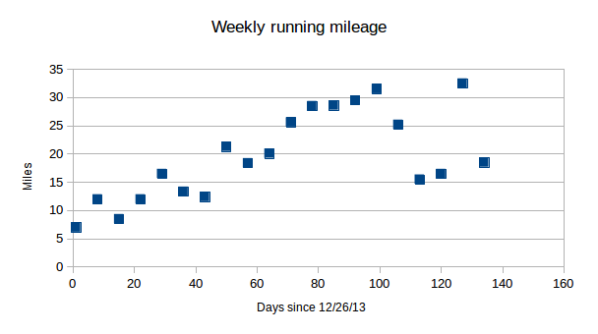They warned me about all of the bad reasons that people get PhDs.
They said that lots of people go into grad school just because it’s prestigious. But I knew that didn’t motivate me, because my friends and family would be more impressed if I produced something tangible.
They said that lots of people go into grad school because the path to admission is clear-cut and easy to follow, and I knew that didn’t motivate me, because I would have found it easier to get a tech job anyway.
They said that you have to love your field so much that the thought of spending your life on a narrow subset of it sounds delightful rather than confining. I told myself that I loved what I did.
They said that you need to love more than just taking classes in your field. You need to love the actual mechanics of doing research — calibrating equipment in the lab, or feeding rats, or skimming papers to see if the proof already exists, or managing the people who take the surveys, or running regressions in Stata. I told myself I liked the research I had done independently, that the work I’d done as a research assistant hadn’t been *that* boring, and that things would get better once I had more freedom.
They told me that if I worked as a research assistant for a year or two before applying to grad school, I would have a stronger application later, have a huge head start in narrowing down my research focus, and could avoid a costly mistake.
I told myself that I knew what I was doing, and that working as a research assistant would build few new skills.
They told me that you can only be great at something you love, and I rejected that. I silently railed against the selfishness, the weakness, the low expectations, and the indulgence implicit in the expectation that happiness is necessary for accomplishment. If people can sew garments in dangerous sweatshops or spend hours in the sun every day just to fetch water or serve as soldiers, then surely I could put my all into a cushy first-world desk job.
Over and over, I told myself that I wanted to understand poverty, and identify and advocate for policies that could help, and that good intentions and stubbornness would be enough to power me through a career as a researcher, personal emotions and preferences be damned.
I was wrong. I wasn’t strong enough.
______
“What are your research interests?” a professor asked at the start of my first grad school visit.
“I’m not totally sure, but I’m really interested in behavioral economics and development.”
“Well, that’s very broad. What aspects of behavioral economics?”
“I have no idea,” I thought.
“I’m especially interested in self-control and bounded rationality,” I said.
I met other grad students, who all seemed far more self-assured and experienced than I felt. So I bullshitted. Everyone kept asking about my research interests, and I always made my best, most honest guess at what I would be studying in a few years, but I never said what I really thought:
“First, is having Research Interests really a thing? Do you think your life would be really different if you were studying something else? I find most things pretty interesting, but nothing really stands out. My goal is to alleviate suffering. Right now it seems like running development randomized controlled trials is the best way to do that, because development RCTs target impoverished populations and often produce actionable evidence. But I’m not sure.”
The Opposite of Mission Creep
First year was mostly about classes. I was happy as long as I had a deadline in the next few days, but when I tried to plan farther ahead, I panicked. I set aside days to work on coming up with research ideas, but I drew only blanks. I found small holes in the literature, made a half-hearted effort to devise strategies to fill them in, and lost interest when no great strategy presented itself. A professor said that we first years should be looking for research ideas everywhere. Economics in the supermarket! Economics when you interview your gas station attendant! Economics when you can’t decide what to eat for breakfast! That terrified me. I was willing to do economics for fifty or sixty hours a week, but not 112.
I made friends, sort of. I worried that if something awful happened to me, I would need to work hard to hide my distress from the people in my program, because they either had incredibly controlled, stress-free lives or were great at putting on a brave face. I thought they never complained about anything “real”, just about petty small-talk issues like exams. I’m ashamed to admit how long it took me to understand just how much stress the first-year requirements caused my classmates, and how real their gripes were. But exams and deadlines never felt like an existential threat to me. I didn’t care the way they did. Anyway, I knew that people would be more open with me if I were more open with them, but my uncertainty about whether I wanted to be an academic and my inability to come up with new ideas felt like a dirty secret that could jettison my job prospects. So I kept quiet about the issues that bothered me most.
My plans to become an international development economist wilted in the face of time pressure and reality. I didn’t want to live in far-away countries. I didn’t want to manage years-long experiments, nor could I imagine myself emulating the non-experimental development literature. I didn’t bother signing up as a research assistant on a development project or talking to development faculty, and I never seemed to make it to development seminars. I had entered grad school without the skills needed to do good research in a foreign country — language skills, familiarity with the country, experience managing people and large projects — and I finished my first year with no more of these skills than I entered with.
G2
In the beginning of second year, my happiness nosedived. My second-year lectures were quite good, and I learned a lot from doing class assignments, but my patience for sitting in class and doing schoolwork was dramatically lower. I wasn’t depressed second year, or constantly miserable. I became sad whenever I entered my department, and happy as soon as I left. If grad school had been “just a job” I would have quit, but I had promised myself that I would spend five years figuring out whether I was good enough at research to justify making a career out of it. I felt bound to honor my pledge, but I found myself constantly wishing for an out. It sounds crazy now, but I sometimes hopefully pondered the fact that a legitimate mental breakdown would be an excuse to leave. But my job was not difficult or uncomfortable by any reasonable standard, and the mental breakdown never came, so I felt ridiculous and weak and ashamed for being sad and bored.
I had to choose two “fields” I would take second-year classes and exams in. My first choice was public economics, which encompasses almost everything relating to the public sector. Many recent papers in public economics had received press attention and some had influenced policy, partially because of the increase in the use of extremely large, representative datasets and the “credibility revolution” in the methods used in microeconomics. I found the research being done in public economics largely important and credible. Choosing my second field was harder.
I didn’t think I would be any good as a development researcher.
I took a class in behavioral economics that was brilliantly taught and immensely illuminating, but I couldn’t figure out how making a marginal contribution to behavioral theory could make the world a better place.
I took a class in labor economics, which appealed to me for many of the same reasons as public economics. The class was well-taught, but somehow it nearly bored me to tears. Reading the assigned papers made me miserable. I eventually dropped the class. That led to the first lie I told as a grad student. Another labor student asked me why I dropped the class, and I said I wanted more time to focus on research and my other classes. In truth, I dropped labor because I couldn’t stand it anymore.
I took a class called “big data”, which was about machine learning and its applications in economics, and I actually enjoyed it. I usually spent the second half of the 2.5-hour lecture daydreaming, but I enjoyed the assignments, which required either mathematical derivations or code. “Big data” fell under “econometrics”, which is essentially statistics, and I chose econometrics as my second field almost by process of elimination.
At the end of my first year, a professor had suggested an interesting question for me to work on and helped me access data, and I kept working on that project on and off. I turned it into my second-year paper. I found interesting results, and successfully doing research should theoretically have been the best part of my life, but most of the work was tedious, and I felt worst while working on that project.
There’s a diagram that posits an inverse U-shape between the difficulty of the work and its engagingness, with peak “flow” occurring in moderately difficult tasks. Empirical research was not at all conducive to flow for me. Most of the work was tedious (“cleaning” data, running regressions, and formatting the results), and some of it was nearly impossible (convincing people to give me access to data).
I hated myself for hating the work. Billions of people had much worse jobs. How could I complain about “repetititve and not always challenging”?
Things only got worse when I had to study for my second-year exams — not because I was worried about failing the exams, but because I didn’t feel like reading. In theory, I had learned all of the material before, but I had immediately forgotten all of the boring parts.
My productivity hit rock bottom. I could stare at a paper for half an hour without taking in a word. I could study all day without learning much of anything.
First-derivative sign change
After my last field exam ended, I rushed across Cambridge to a Boston Python User Meetup. I sat through a talk I didn’t understand, and then through a talk about using Pandas with financial data that I did understand. I went to the after-event, at a bar, and talked to programmers working in various areas, and to a recruiter who was looking for a statistically-informed developer to create adaptive pre-tests for online courses. I took a couple business cards, said I’d get in touch if I decided to leave my program, and went home. I’m an MIT alum with many friends in the tech sector, and talking to software developers didn’t feel like flirting with running away — it felt like walking up to the train that could take me back home.
With interest in my work gone, I had spent second year motivated only by fear and shame. I spent that summer simultaneously figuring out what work I actually enjoyed, and what I was going to do with my life. I considered leaving Harvard immediately, staying for long enough to tie up loose ends and build skills while looking for a job, finishing my PhD, or trying to make academia work while avoiding the parts I didn’t like. I looked into various career paths by talking to and emailing friends, browsing job listings, doing a lot of Google searches, and participating in a consulting competition. I decided to try to finish my PhD, but exit as quickly as possible, and then move into a private-sector job. I now try to take on projects that I will enjoy instead of projects that matter.
That summer and in my third year, I figured out that I do like some things about academic life. I like working things out on pencil and paper, and I like writing code. I like helping other people, whether by providing feedback on a presentation or proposal, answering my students’ questions, or explaining a concept or procedure. Other people’s stuff is always more interesting than mine.
But I’ve still preferred some of the non-research jobs I’ve held to the life of a grad student. I like having an employer; I’m much more appreciated when someone actually needs my work. I like facing varied challenges, working near the people I’m working with, and, most of all, I vastly prefer writing code to writing text. (80,000 Hours’ research suggests that the things I don’t like about being a grad student are things that would give almost anyone “low job satisfaction.”)
Once I was sure I was leaving, I came out. I told people that I wasn’t going to stay in academia and that I had never been sure that I wanted to. At first, telling my former dirty secret felt like weird oversharing. Some of my fellow grad students were taken aback, and took a minute to figure out how to respond without condescension (“That’s good too…”). But for the most part, people responded positively, and I felt much better.
I Wish I Could Write a Happy Ending, But I Failed
I’m very happy now, so I want to write a happy ending, but I don’t think that’s appropriate. I entered grad school meaning to figure out 1) when, how, and whether economic research benefits society, and 2) whether I would be a great researcher.
The second question turned out to be easy. I don’t like research enough to be great at it. I can make myself work long hours, but when I don’t like my work, I don’t dream big dreams. I solve the problem in front of me. I focus on the next deadline. I think about the minimum necessary to avoid failure instead of hatching grand schemes. I’m more creative, ambitious, and big-picture when I’m anywhere but my department.
But the other question is hard. I don’t know how important economic research is to the rest of society, and I don’t know how to figure that out. Economists talk endlessly about identification — showing that we can form credible conclusions — but rarely about social impact. Academia uses productivity metrics that have little to do with the real world. When a professor advises me on whether a new research project is worth my time, I might hear whether the question or methodology is novel, or that the project might be worthy of a top field journal, or that it’s worthwhile as long as it doesn’t take time from my job-market paper. I won’t hear whether the question has policy implications, whether it lies in an area where research can impact policy, or whether the work would be noticed outside academia.
I don’t know where the returns to effort are highest. Am I more likely to change the world by spending years on one international development field experiment? Or is it better to spend the same amount of time writing several papers using existing data from the United States? Or even more papers on methodology? Should I replicate other’s studies? Or expose bad methodology? Is it better to shoot for quantity over quality and “publish” in a blog or the popular press, even if I’m often wrong? What kind of research impacts policy most? Where is it most likely to impact other research? Who is listening?
I have no idea. Someone ought to write a paper on how to do socially beneficial research. As long as that someone isn’t me.



